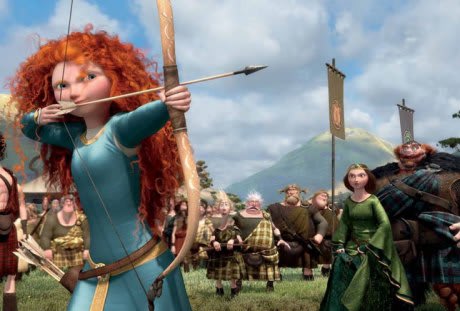Bookending Brave, the latest animated Pixar offering, are brief, seemingly tagged-on voiceovers about the nature of destiny and fate as something to grab hold and take charge of, which, considering the tenets of fatalism and the overall trajectory of the film, doesn't make a great deal of sense. The basic story is that of butting heads and thwarting tradition in tenth century Scotland, with young tomboy Princess Marida (Kelly Macdonald) responding with decided hesitance to an arranged marriage proposed by her mother the Queen (Emma Thompson). Through a series of defiant and actively disrespectful acts, Marida eventually escapes her "destiny" by engaging a witch and casting a dangerous, transmogrifying spell on her mother to force her agenda. Thus, with this act of selfishness, a bond is forged between mother and daughter, and "fate" apparently comes to be. In taking the optimistic bookends at face value, they seem to suggest that aggressively asserting one's opinion will result in a beneficial ending for all involved, even if it means potentially killing the disagreeing party. But Brave has something else going on that addresses the core human fault causing conflict in the first place. Every problem that arises throughout this exceptionally animated and aesthetically detailed pseudo-feminist parable comes from the inability to listen or acknowledge the perspective of others. As mother and daughter bicker about the nature of arranged marriage, neither party steps back to ask why the other feels the way they do. Instead, they talk over each other and merely assert their opinion more aggressively, which is something specifically evident in the many men in the film that respond to different perspectives by yelling and fighting. Even when Marida takes the route of casting a spell on her mother, she never asks questions or uses effective communication to determine potential side effects or outcome; she merely listens to what reiterates her base ego desires and focuses on that. In such, the big lesson of the film, which comes when limited consciousness and intense solipsism are applied by Marida's father in a life threatening scenario, seems to be that the female role is that of using complex reasoning to quell the overriding male tendency to turn to violence before considering a perspective other than their own. And since this assertion would likely offend the many parents watching the film with their kids — unaware of their mental limitations and kneejerk tendency to freak out when others don't see things exactly as they do — the whole destiny voiceover acts as a similar quelling device. There's also an abundance of goofy shenanigans involving bears running amuck to keep the kids occupied. Similarly distracting is the deep, rich 3D animation, which, while not showy at all, is particularly impressive on the home 3D theatre. Even the short 3D film included with the Blu-Ray, La Luna, uses the format well in telling the story of a boy showing ingenuity amongst three generations of tradesman. The supplemental material in the package is surprisingly sparse, however. There's a special feature about the voices, the animation of the hair and the horse, which cover about ten minutes worth of discussion. No games or playful additions are included for the youth audience.
(Buena Vista)Brave: 3D [Blu-Ray]
Mark Andrews, Brenda Chapman and Steve Purcell

BY Robert BellPublished Nov 24, 2012